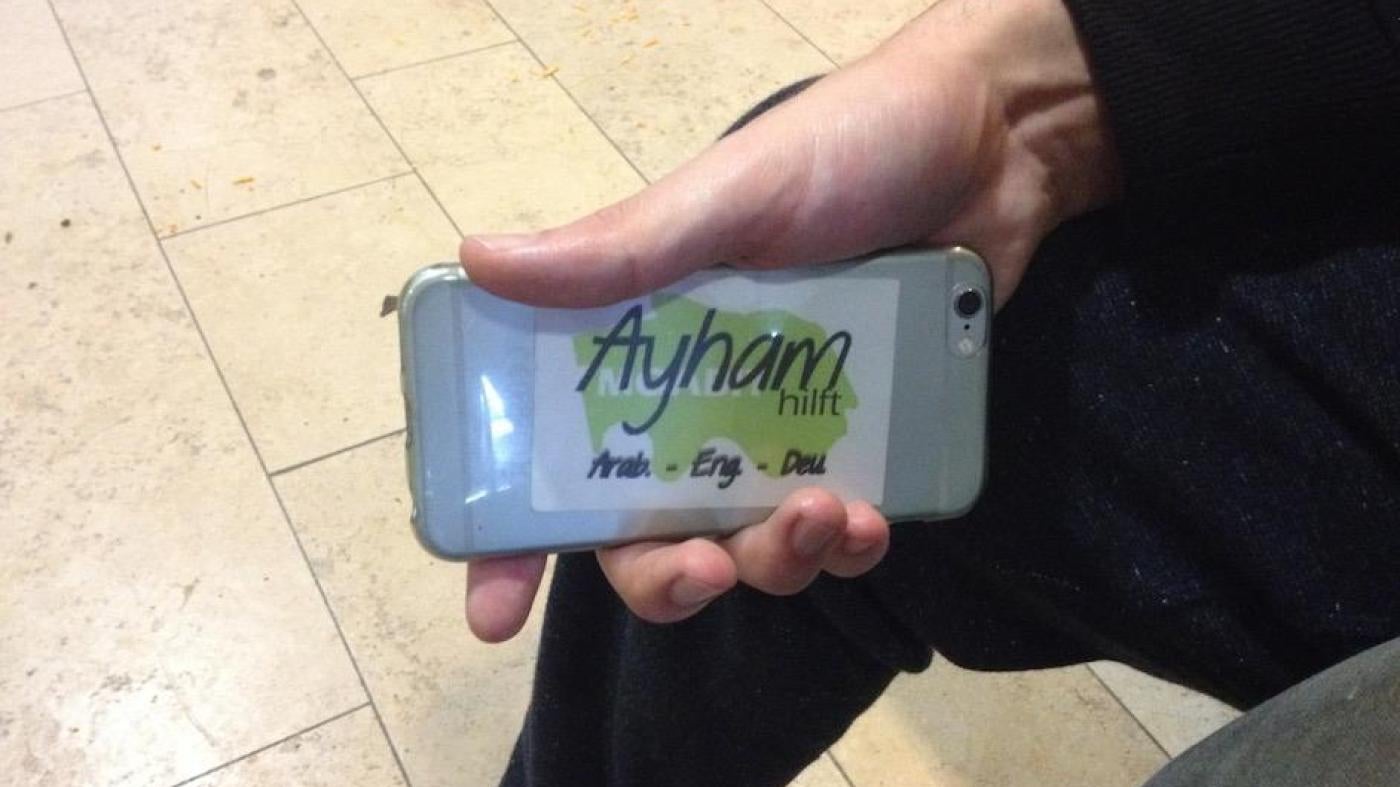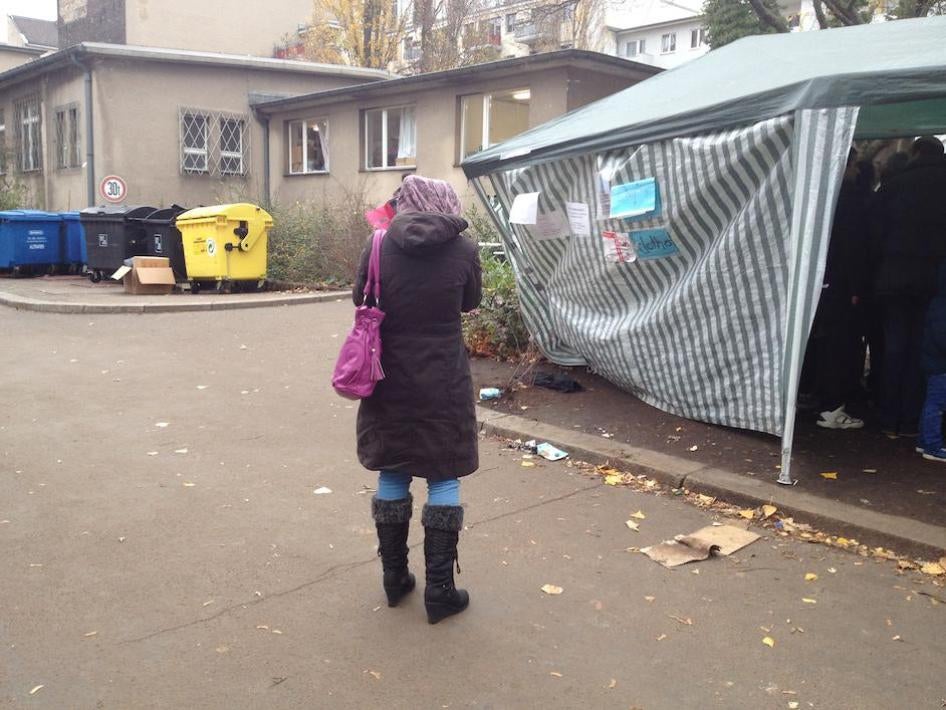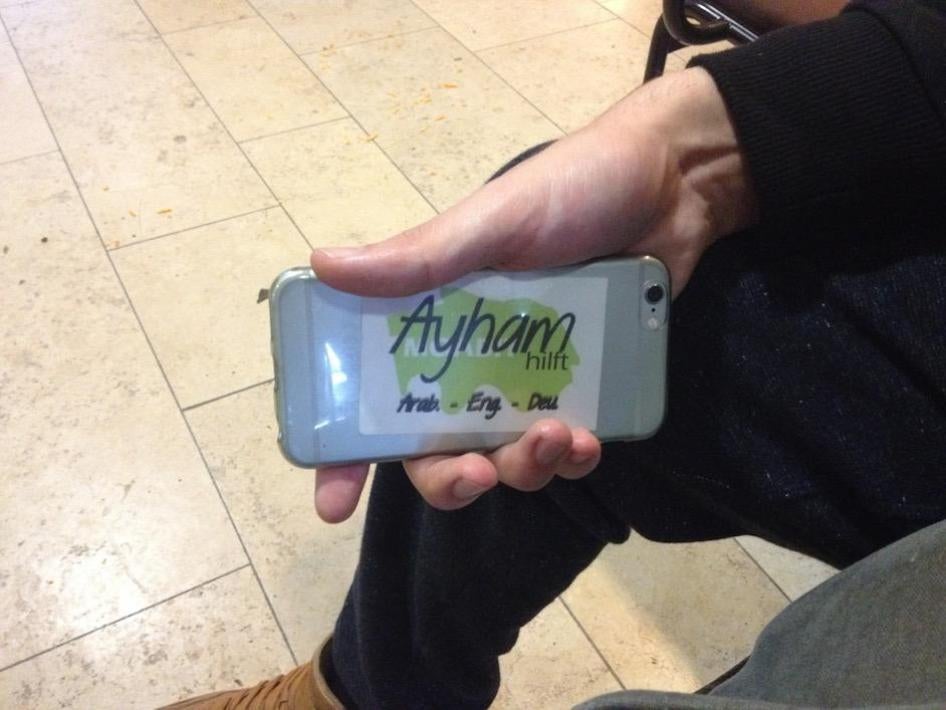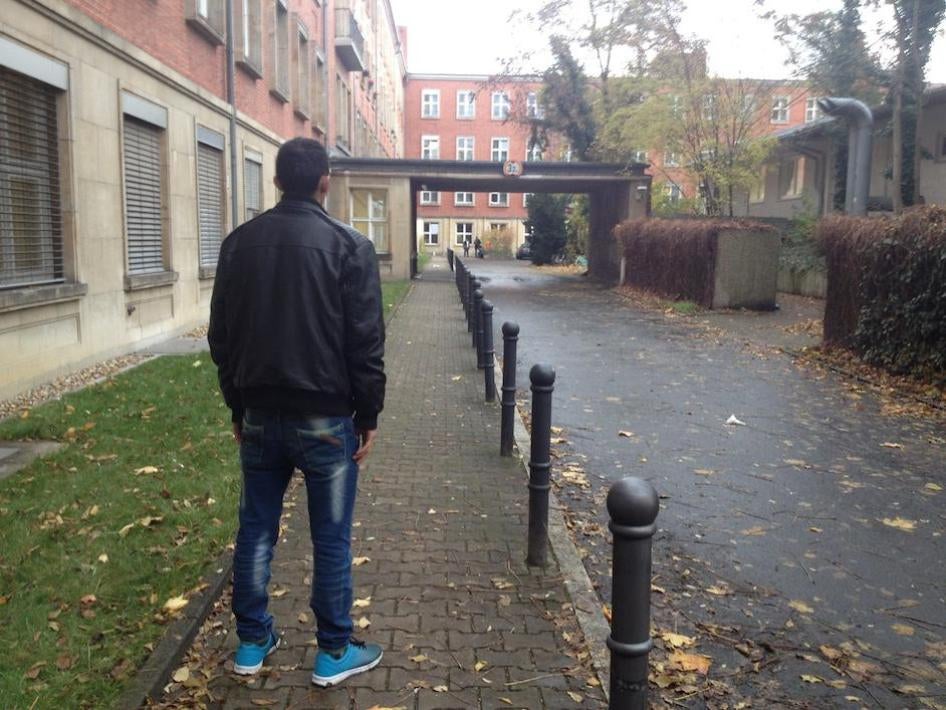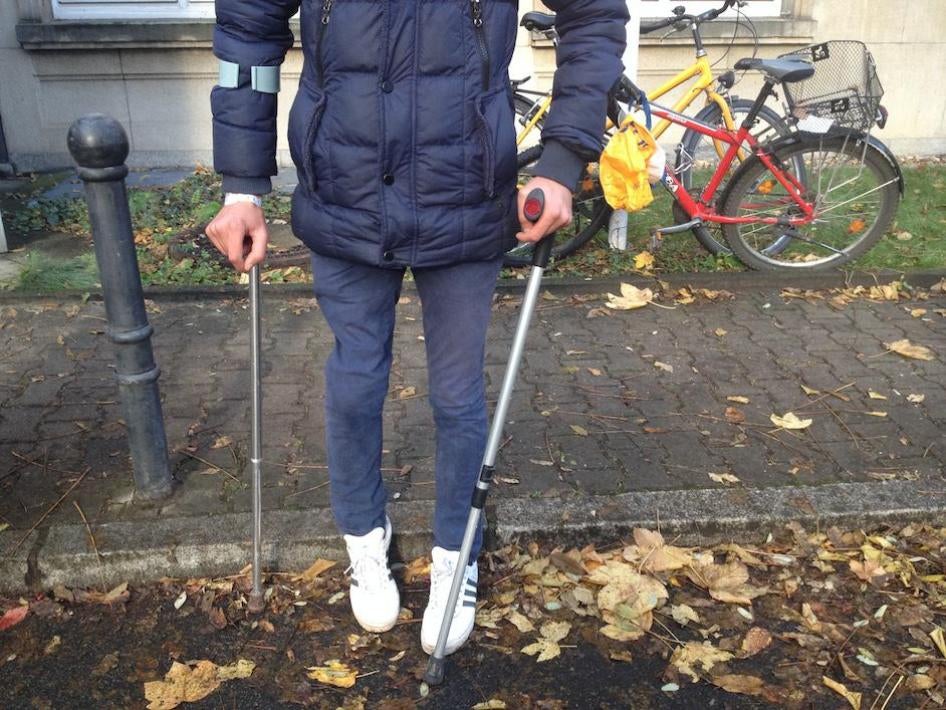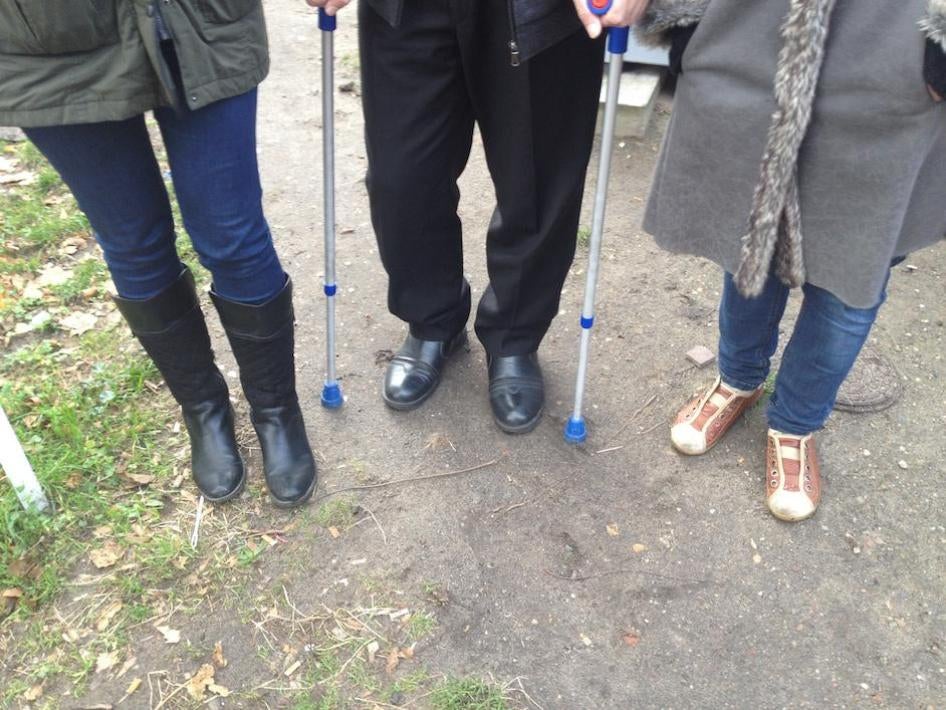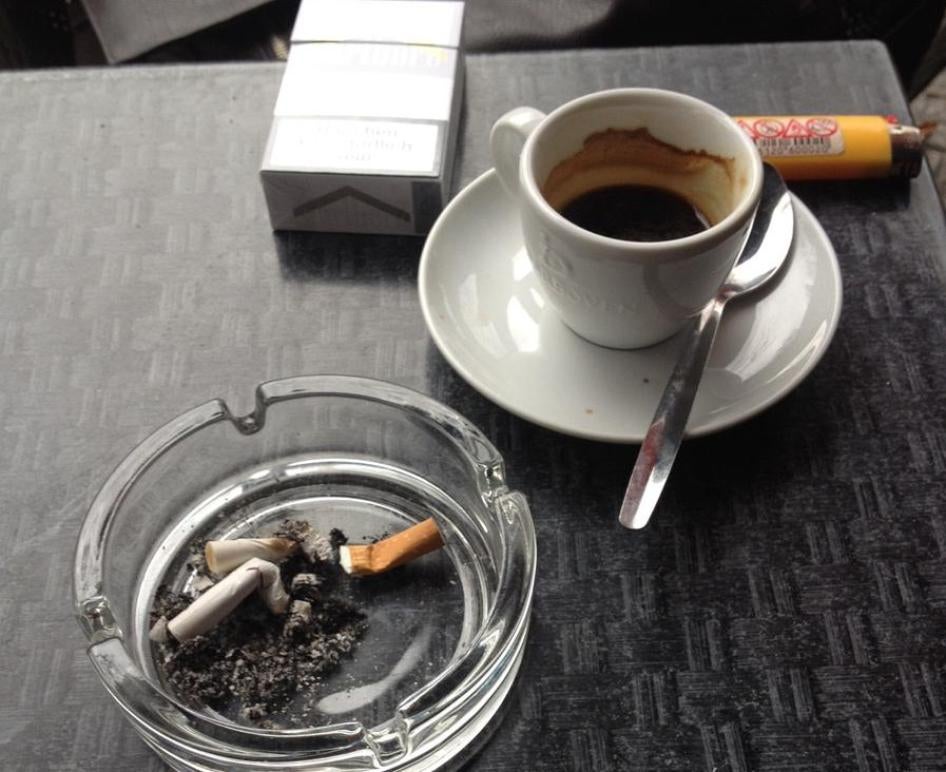They survived treacherous boat journeys between Turkey and Greece, barbed wire in Hungary, and cascading border closures across the Balkans – a journey, mainly on foot, that took months. Now, safe in Germany, with the most dangerous part of their trek behind them, a new journey begins for thousands of asylum seekers. How to start a new life, in a new land, unmoored from everything familiar?
I went to a Berlin refugee center, the Landesamt für Gesundheit und Soziales (Lageso). No one lives there – refugees are housed in gymnasiums, an unused airport, apartments, a former nursing home and other “camps” throughout the city – but the newest arrivals come here for clothes, food, and emergency medical treatment. Here are their journeys, and their hopes for their future.
Zeinah*, 27, from Damascus
I meet Zeinah waiting in line in the clothes tent. She has a bright pink purse and mobile phone case and a pale pink hijab, and she comes across as tart-tongued and sharp. She arrived in Berlin one month ago, leaving Syria with five of her cousins because she was “afraid of the war, afraid of the bombing, and afraid if you walk in the street, bombs could come and kill you.”
Life in Germany: “It’s good here. There is electricity. My relatives in Syria say it’s cold, that there’s no warmth and no money for fuel.”
She does wish her camp had a washing machine, and she’s using shampoo to hand-wash her clothes. Pills to treat her migraines are expensive in Germany, she says. Also, if you forget your card, people at the food tent won’t give you a meal. “But I feel safe here, I feel good in Berlin.”
Her future: “I cry sometimes because I miss my mother and father,” who have been living in Lebanon. Zeinah hopes to bring them to Germany, but she’s been told it may be difficult because she’s over 18.
She wants to learn German and improve her English – in Damascus Zeinah taught English to children at a private school. She enjoys teaching and wants to continue doing it, and she makes a point of showing a certificate she received from the nonprofit Mercy Corps for completing a week-long class in how to provide people with psycho-social support.
“Sometimes I have depression,” she says, her tone softening for the first time in our conversation. “I want to listen to the children, help them feel safe and give them advice.”
Amira*, 24, Daraa, Syria
Amira exudes calm, despite having arrived in Berlin just 15 days earlier after crossing seven countries with her four children, ages 10, 9, 6 and 2. They survived a terrifying boat ride to Greece and camped outside the Austrian border without shelter for four days. “The children were so cold,” Amira says. Today, they all stand under a tree, eating sandwiches and drinking out of paper cups. The children, at turns shy and curious, dart back and forth as Amira shares their extraordinary story.
Their journey: Her husband arrived in Berlin three months ago. They had all fled to Jordan three years ago, but after her husband made a trip to Syria, Jordanian officials wouldn’t let him reenter the country. So they traveled to Turkey. But her husband, a construction worker, couldn’t find work there – he had been shot in the hand in Syria, and despite three operations it still wasn’t completely functional. So he came to Germany and they followed.
Life in Germany: “I feel safe in the camps in Germany – I feel much better here.” She is waiting to register, so her family can live together. Her husband, who arrived a few months earlier, is staying in a hotel, and she and the children are living in a camp.
Their future: “I just want to be safe, to live in safety, for our children to be safe. I don’t really need anything else.”
Hassan*, 19, Damascus, Syria
Full of easy-going banter and laughter, Hassan is the kind of person you would want as a friend. It’s not surprising that although he left home with just his brother, he picked up 31 friends along the journey – one from Iraq, the rest from Syria. They crossed Europe together, and are all now in Germany. He swipes through pictures of them on his phone – everyone sitting together with their backpacks in grassy fields – like any teenager eager to show off photos of friends. Another picture shows him running across a clearing, evading Hungarian police, he says. His mood darkens when asked about his family. He becomes stony, seems taller, broader and harder. “No,” he says, sharply. “I don’t talk about my family.”
His journey: In the middle of the Aegean Sea, trying to reach Greece from Turkey, the boat’s motor stopped and the boat began taking on water. He tells me the 21 passengers were crammed so tightly together they couldn’t move, so Hassan’s brother and five friends jumped into the sea, giving others space to bail the water. “It was not fun,” Hassan says. He says he called the Greek Coast Guard, but they didn’t come. Eventually, the motor re-started and they made it to land.
Life in Germany: He’s been in Germany for two-and-a-half months and volunteers at the refugee center. In the morning he hands out clothes and baby carriages, and in the evening he works in reception, helping sort out food and shelter for new arrivals. He speaks English well and can help translate.
“So many people here need help,” he says. “In Munich [where he first arrived in Germany] and in Berlin I was so scared. That’s why I want to help, to tell people that it will be okay, that it’s a nice country.”
His future: In Syria, Hassan was in his second year of business management studies. He’d like to complete his education in Germany. “I want to study and have a home,” he says with a good-natured smile.
Nooda*, 32, from Aleppo, Syria; Sabeen*, 23, from Deir Alzor, Syria
Nooda and Sabeen met at their camp in Berlin and became friends. Both dote on Sabeen’s 5-year-old son, Adad*, calling to him when he wanders too far and tousling his hair when he comes close. The attention to Adad takes on a deeper, sadder meaning when, later in our talk, Nooda speaks of her own young son, who she says was killed four years earlier when Assad’s forces bombed their home. She was pregnant at the time and lost her unborn child as well. The women’s husbands walk up and join late in the interview; all four talk at once, but no one seems bothered by the interruptions.
Their journey: Both families shudder at the memories of their boat ride to Greece. “The moment we saw the boat we didn’t want to get on,” Nooda says. “But the smuggler forced us. Death was near.”
Life in Germany: Right now, the men and women are required to live in separate parts of their camp. They’d like to live together as families.
Their future: “I want to have a son here,” Nooda says. She was a hairdresser and wants to do that here, too. Her husband was a chef, he says, and knows how to cook Western food. He’d like to cook both for Germans and Syrian asylum seekers.
Sabeen says her family decided to flee when her brother and cousin were killed “by Assad’s bombs.” Now, she wants to be a nurse. “I saw many terrible things. I couldn’t help when my brother and cousin were killed. Maybe in the future I can help people.” Her husband designed the exteriors of buildings, and says: “I just want to live and save and help the boy have a future.”
Nooda speaks for Adad, who had wrapped himself around his father’s leg. “The boy wants to live. He’s just a child, he wants to live and play like all kids around the world.”
Adnan*, 19, from Aleppo, Syria
Adnan looks agitated and nervous, his eyes wide. He has gelled hair, trendy washed-out jeans, and an angular face, and talks rapidly about problems with documents that he feels urgently needed fixing. He calms down as he tells his story.
His journey: He fled Syria with his sister, two brothers, and one brother’s pregnant wife and toddler after his younger brother, a fighter opposed to Assad, was killed, he says. In Slovenia, his sister-in-law went into labor. Adnan and the toddler accompanied her to the hospital, where she gave birth. But in an upsetting turn of events, they were returned to a different camp. Adnan frantically searched for his family, the Red Cross making phone calls on his behalf. After four days, he, his sister-in-law and her children continued to Berlin without the rest of their family.
Luckily, Adnan found his family using the chat app WhatsApp, and they’re also in Berlin – at a different camp. But they can’t live together until their documents are corrected, Adnan says. Right now, “I’m listed as the baby’s father on the birth certificate,” he says, “and the child [the toddler] has no documents.” As his mind returns to the documents, Adnan grips a nearby waist-high pole and starts shaking it.
He’s waited outside the appropriate tent for 10 days to correct the documents. “About a week ago I made it inside the building, but they told me my whole family needed to be there. When I left the building to fetch them, we couldn’t get back in.” They haven’t been denied any services because of this, he says, but he worries it will create big problems in the future.
Their future: “We just want to be safe and to bring our mother here. And when the war ends, we want to go back to Syria.” I asked if he wanted anything else. “I don’t know, I don’t know what I want. I’m confused. I just want the correct documents.”
Mohammed*, 26, from Damascus, Syria
Mohammed’s smile is so massive you notice it before his crutches, or the fact that his right leg is mangled. It happened two-and-a-half years ago, in Syria’s Yarmouk camp for Palestinians, he says. He and some friends ran to help people in a burning building. They had taken shelter there when they saw a sniper nearby. Then a small bomb struck the building, killing five of his friends and destroying his leg, he says.
His journey: He traveled to Germany with his girlfriend and three friends, passing through Lebanon, Turkey, and Greece. In Croatia, police saw his leg and gave him a ride to the Hungarian border. “It was the best thing that happened on the trip.”
Life in Germany: While he feels safe in Berlin, the reality of being in Germany falls far short of his expectation. “I sometimes wish I had never come here.”
Mohammed’s main issue is standing in line to register – a challenge for someone on crutches. “I have a special situation with my leg. I thought they would have special instructions for me, but instead I’m treated like everyone else.”
When he first arrived, he says, he stood each day for a week outside the registration tent. “I was very, very tired from the trip and lost consciousness. When I woke up I was in the hospital.” He says he was treated quickly.
His future: He plans to live with his aunt, who has been in Berlin for a year, and he says his father and brother recently arrived in Trier, Germany. A surgeon told him that once he received his green card they could treat his leg at a Berlin charity hospital. Mohammed would like to work as a barber, a job he’s done since he was 14. “It makes me happy,” he says, laughing. “I like creating new styles for people, renewing their look.”
Ahmad* and Nour*, 54 and 50, and their daughter, Ahlam*, 23 from Damascus
Ahmad and Nour’s family arrived in Berlin via a different route – on a plane, since they had visas to enter the country. They have another daughter working in computer science who has residency in Berlin, they say. Ahlam has lived for the past year in Paris, she says. Her parents traveled to Berlin with her 17-year-old younger brother. “We were afraid they’d take my brother into the military,” she says.
Life in Germany: Their journey was easy, but registering isn’t. Ahmad has serious problems with two discs in his spine. He can’t use his knees or sit for more than 10 minutes, and he depends on crutches. He already spent eight days in a German hospital. This week, they stood waiting in line for three days for registration papers and still don’t have them. “He’s been getting worse every day since we’ve come here,” his daughter says.
Their future: Ahmad worked as an accountant, and Nour wants to work in a bakery.
Ahlam has a Bachelor of Arts degree in architecture and plans to study German. “I want to see my mom working, my dad getting better, and me with a good job and a good life. And all of us, living in a safe place,” she says.
John*, 20, from Asmara, Eritrea
John sits on a low stone wall, talking with other East Africans. They stand out in the sea of Middle Eastern asylum seekers. He is from Eritrea, a small, extremely repressive country in the Horn of Africa. John seems conflicted about being different than most of the asylum seekers here – at one point saying he wishes just to be left alone, at another that he wishes more people would speak with him. He gestures with his cigarette as he speaks, his movements elegant and graceful.
His journey: He came here because “there’s no work, there’s nothing in Eritrea. You have to be a soldier there all the time. I went to prison because I didn’t want to be a soldier.” The Eritrean government imposes mandatory, indefinite military or national service on all Eritreans. Service can last for years or even decades and UN experts have said that “slavery-like practices are routine.” Although it’s hard to escape the country, thousands of Eritreans have fled and continue to cross the borders and set off on perilous journeys to find refuge.
After John escaped, he traveled through Ethiopia and Sudan, then from Libya took a boat to Europe.
Life in Germany: The camp and Berlin are “okay, no problem,” he says. “I put my headphones in, there’s no problem.” But at the same time, he doesn’t speak Arabic, and doesn’t always know what’s going on. Also, the people working at the camp won’t talk to him and won’t help him, he says. “I don’t get any respect here. Their first priority is the Arab people.”
His future: John worked as a mechanic in Eritrea’s military. “I want to work, any kind of work,” he says.
Fathi*, his wife Haya*, and their six children, from Hama, Syria
It was hard to imagine how Fathi and Haya traveled from Syria to Berlin with six children, ages 11, 10, 8, 3, 2 and 4 months, in tow. As we talk, the kids are in constant motion, wandering off, getting distracted, and being gently redirected back by their parents.
Their journey: “We spent 15 hours walking through Hungary with our children,” Haya says, describing that as the worst part of their trip. “We were so tired.” What was that like, I wondered, with a baby and two toddlers? Who didn’t get carried when everyone’s arms were full?
Life in Germany: They’ve been in Germany for about six weeks, and during that time they’ve been moved between seven camps. In one, someone stole Haya’s gold and mobile phone. Because of this, she doesn’t feel safe, she says. At the same time, she says that some of the camps are very good and have given them everything they need.
Their future: “We want to stay in the same place, not move from camp to camp,” Haya says.
Their three oldest children stopped going to school in Syria when the government converted their school into a camp for displaced people aligned with Assad. “We just want our children to be safe and go to school like other children,” Fathi says. “We just want to return to Syria. In Germany we just want to live and save money and have the kids go to school.”
Sami*, 27, from Qamishli, Syria
For a number of years, Sami, a doctor, together with a group of his doctor friends, secretly treated wounded protesters – which can lead to arrest under Assad’s regime. He tells me that eventually he was detained for roughly two months and tortured. After he was released, his family urged him to flee the country.
His journey: Before deciding to come to Europe, Sami spent seven months in Turkey, where he kept to himself. “I just read books and went to the supermarket. That’s it.” He came to Germany so he could continue his studies.
Life in Germany: Sami lives with a German host family. He has his own room, TV, good food, and enjoys visiting his host “grandparents.” They help him navigate his new life. “I have a second family now,” he says. Sami volunteers as a translator at a refugee center.
His future: Like many asylum seekers, Sami takes German classes. He hopes to bring his girlfriend to Berlin. He also wants to continue his medical studies in Germany, but no longer wants to be a surgeon – he now wants to be a psychiatrist. “I think many Syrians will need this. So many kids saw so much blood. Then there’s the detainees, the people who experienced war…” he trails off. He wants to move back to Syria after the war.
*Not their real names
